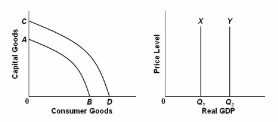Monetary payments to nonowners of a firm are called:
A. implicit costs.
B. accounting costs.
C. explicit costs.
D. economic costs.
Answer: A
Economics
You might also like to view...
The reason we are willing to accept money with no intrinsic value is that
A) the money supply is backed by an equal amount of gold and silver. B) we have a fiduciary monetary system in which currency has both acceptability and predictability of value. C) the value of the money varies directly with changes in the price level. D) paper currency may be exchanged for full-bodied money.
Economics
Refer to the graphs. An increase in an economy's labor productivity would shift curve:

A. AB to CD and shift curve Y to X.
B. CD to AB and shift curve X to Y.
C. AB to CD and shift curve X to Y.
D. X to Y while leaving curve AB in place.
Economics